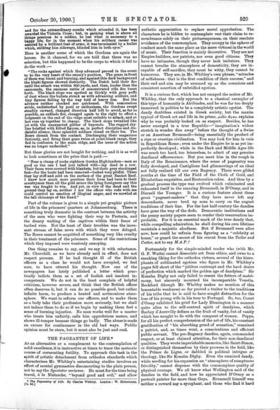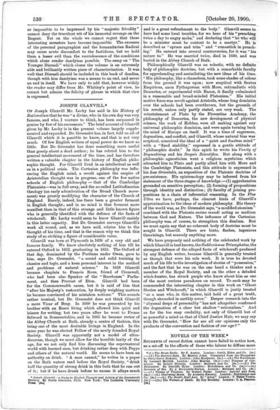THE PAGEANTRY OF LITE.*
As an alternative or a complement to the contemplation of solid excellence, it is instructive at times to trace the meteoric course of coruscating futility. To approach this task in the spirit of artistic detachment from orthodox standards which characterises Mr. Whibley's entertaining studies involves an effort of mental gymnastics disconcerting to the plain person, not to say the Spectator reviewer. He must for the time being travel, a la Nietzsche, "beyond good and evil," and allow * 2h8 Pageantry of 1418. By Charles Whibley. London : W. Heinemann. [X ed.]
testhetic appreciation to replace moral approbation. The characters he is bidden to contemplate rest their claim to re- membrance solely on their picturesqueness, on their resolute avoidance of the commonplace. They occupy in the sphere of conduct much the same place as the mere virtuosi in the world of music. Their function is mainly decorative. They are not Empire-builders, nor patriots, nor even good citizens. They have no intimates, though they never lack imitators. They cannot breathe the atmosphere of domesticity, they are in- capable of self-sacrifice, they must be witty, they cannot be humorous. They are, in Mr. Whibley's own phrase, "miracles of selfishness : that is the first condition of their success," and their end and aim may be summed up as the conscious and consistent assertion of unbridled egotism.
It is a curious fact, which has not escaped the notice of Mr. Whibley, that the only approach to a classical exemplar of this type of humanity is Alcibiades, and he was far too deeply immersed in politics to be a completely artistic egotist. The dandy doubtless existed in Greek society, but the maxim typical of Greek art and life in its prime, ihnUr clyar, explains why he was probably looked on as suspect. Besides, he has never emerged in a true Republic—" imagination's widest stretch in wonder dies away" before the thought of a Swiss or an American Brummell—being essentially the product of a ripe or overripe civilisation. You may look for him in vain in Republican Rome ; even under the Empire he is as yet im- perfectly developed ; while in the Dark and Middle Ages life was much too hard, too leisureless, to admit of any genuine dandiacal efflorescence. But you meet him in the rough in Italy of the Renaissance, where the sense of pageantry was fully developed, and Castiglione had glimmerings of an ideal not fully realised till our own Regency. There were gilded youths at the time of the Field of the Cloth of Gold, and Elizabethan exquisites, and Restoration rakes. And thus by a gradual process the type was evolved which culminated and exhausted itself in the amazing Brummell, in D'Orsay, and in Disraeli the Younger. It is a curious feature about these great " pageant-makers " that they have never left any descendants, never bred up sons to carry on the august traditions of their line. For the last half-century the dandies have gone the way of the dodo. Democratic institutions and the penny society papers seem to render their resurrection im- probable. For it is an essential mark of the true dandy that, while compelling admiration, he shall during his own lifetime maintain a majestic aloofness. But if Brummell were alive now, how could he refrain from figuring as a "celebrity at home," or guard the secret of his cravat from the Tailor and Cutter, not to say 111.A.P.1 Fortunately for the simple-minded reader who (with Mr. (1 F. Watts) cannot dissociate art from ethics, and owns to a sneaking liking for the orthodox virtues, several of the hiero- phants of sublimated egotism who figure in Mr. Whibley's pages fell short of the "pitiless contempt and the hard desire of perfection which marked the golden age of dandyism." Sir Kenelm Digby not only failed to resent the fetters of matri- mony, but sincerely mourned his incomparable Venetia. Beckford (though Mr. Whibley makes no mention of this lamentable weakness) so far proved a traitor to the traditions of his tribe that be is said to have sought distraction for the loss of his young wife in his tour to Portugal. So, too, Count d'Orsay exhibited his grief for Lady Blessington in a manner quite alien to the self-centred spirit of dandyism, which Barbey d'Aurevilly defines as the fruit of vanity, but of vanity which has naught to do with the conquest of women. Pepys, for all his perfect comprehension of the art of life, his constant gratification of "his absorbing greed of sensation," remained a patriot, and, as times went, a conscientious and efficient public servant. The pre-Regency dandies, again, commanded respect, or at least claimed attention, for their non-dandiacal qualities. They wrote imperishable memoirs, like Saint-Simon, or distinguished themselves by their prowess in the field, like the Prince de Ligne, or dabbled in political intrigue or theology, like Sir Kenelm Digby. Even the unmixed dandy, while needing for his expansion an "atmosphere of sumptuous frivolity," cannot dispense with the commonplace quality of physical courage. We all know what Wellington said of the dandies in the field, and how he appreciated D'Orsay as a portrait painter far more than Goya. Brummell himself was neither a coward nu a sycophant, and those who find it hard or impossible to be impressed by his "majestic frivolity 3' cannot deny the truculent wit of his immortal revenge on the Regent. Yet on the whole we cannot regret that these interesting monsters have become impossible. The excesses of the personal paragraphiat and the humanitarian Radical may cause acute discomfort to the fastidious, but we hold them a lesser evil than the recrudescence of the conditions which alone render dandyism possible. The essay on " The Younger Disraeli" which closes the volume is an extremely able and brilliantly written piece of characterisation. It was well that Disraeli should be included in this book of dandies, though with him dandyism was a means to an end, and never an end in itself. We have only to add that, however widely the reader may differ from Mr. Whibley's point of view, he cannot but admire the felicity of phrase in which that view is expressed.







































 Previous page
Previous page